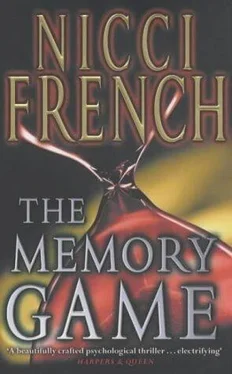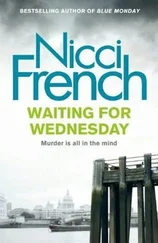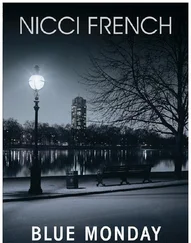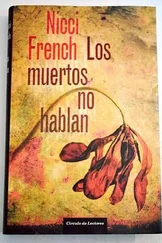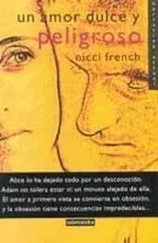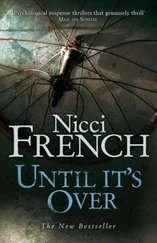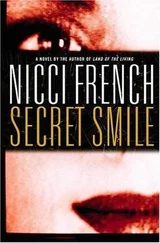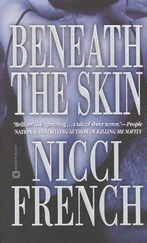Nicci French - The Memory Game
Здесь есть возможность читать онлайн «Nicci French - The Memory Game» весь текст электронной книги совершенно бесплатно (целиком полную версию без сокращений). В некоторых случаях можно слушать аудио, скачать через торрент в формате fb2 и присутствует краткое содержание. Жанр: Триллер, на английском языке. Описание произведения, (предисловие) а так же отзывы посетителей доступны на портале библиотеки ЛибКат.
- Название:The Memory Game
- Автор:
- Жанр:
- Год:неизвестен
- ISBN:нет данных
- Рейтинг книги:4 / 5. Голосов: 1
-
Избранное:Добавить в избранное
- Отзывы:
-
Ваша оценка:
- 80
- 1
- 2
- 3
- 4
- 5
The Memory Game: краткое содержание, описание и аннотация
Предлагаем к чтению аннотацию, описание, краткое содержание или предисловие (зависит от того, что написал сам автор книги «The Memory Game»). Если вы не нашли необходимую информацию о книге — напишите в комментариях, мы постараемся отыскать её.
The Memory Game — читать онлайн бесплатно полную книгу (весь текст) целиком
Ниже представлен текст книги, разбитый по страницам. Система сохранения места последней прочитанной страницы, позволяет с удобством читать онлайн бесплатно книгу «The Memory Game», без необходимости каждый раз заново искать на чём Вы остановились. Поставьте закладку, и сможете в любой момент перейти на страницу, на которой закончили чтение.
Интервал:
Закладка:
‘But why did it happen to be Alan that I saw?’
Thelma shrugged. ‘Don’t ask me. You’re the one who knows him. It may be that he was the focus for particular strong feelings during the period of your analysis. At a time when your creative mind was searching for a villain, he seemed like somebody who could be violent to a woman. The imagined murder was the moment when your inner and outer worlds coincided. In a perverse way, it was something of a triumph for the psychoanalytic method. It’s unfortunate that reality has intervened so stubbornly.’
‘But why on earth did he confess?’
‘People do, you know. They have their reasons.’
‘Oh, God,’ I said, and my head slumped into my hands. ‘You’re asking if Alan Martello is the sort of man who might deal with feelings of guilt and despair by making a wild, self-destructive, theatrical gesture? You’re fucking right he is.’
Thelma drained her glass. ‘So there you are then.’
I looked at my own glass. No chance of draining that. There was at least a triple scotch left and I already felt drunk. I stood up, a little unsteadily. ‘I think I’d better go,’ I said.
‘I’ll call you a taxi.’ She did so and it was barely a couple of minutes before the doorbell rang.
‘I suppose you’ll be wanting to use me as an exhibit in the crusade against recovered memory,’ I said as I stood in the doorway.
She gave a sad smile. ‘No, don’t worry. Your experience will have no effect whatsoever on their certainties.’
‘That can’t be true.’
‘No? What about you? What would you have thought if you had arrived at your river and found it flowing the right way?’
‘I don’t know.’
‘Look after yourself on the way home,’ she said, as I got into the cab. ‘You’ll have to phone the police tomorrow morning. They’ll need a whole new murder inquiry.’
‘Oh no they won’t,’ I said.
Thelma looked puzzled but the cab was moving off and I was already too far away to say anything.
Forty
We drove out of London on the A12, against the commuter traffic, and were quickly in the pseudo-countryside between the fringes of London and the Essex flats beyond. I had the road atlas open on my lap. Except for my directions, nobody spoke. We left the main road and entered the mess of roundabouts, corridor villages, industrial estates. A bypass was being constructed, and we sat for half an hour in a single line of traffic, looking at a man rotate a sign. Stop, go. Stop, go. I looked at my watch repeatedly.
For the last stages of the journey, the map was unnecessary. We followed the blue signs to Wivendon. We parked outside a neo-classical building that could have been a supermarket or a tourist centre. But it was a prison.
The others stayed in the car park. I walked up the path, between low privet hedges, to the security gate. My identity was checked, driving licence inspected, bag removed from me. A woman in a navy blue uniform smiled but prodded me through my arms and under my dress. I was led through relatively small doors, much as if I were being led through the staff entrance at a municipal swimming baths.
I sat in a waiting room, where a flowerless pot plant and old magazines stood on a central table. On the wall was a poster advertising a fireworks display. The door opened and a man came in. He was dressed in brown corduroy trousers and a rough checked shirt, unbuttoned at the neck. His thick, reddish-brown hair hung down over his collar. He was heavy-set, about my age. He held several thick brown folders under his left arm.
‘Mrs Martello?’ He came and sat down beside me, and held out his hand. ‘I’m Griffith Singer.’
‘Hello.’
‘You look surprised.’
‘I suppose I’d expected a warder.’
‘We try to be a bit more informal than that.’
‘How long have I got?’
He raised his eyebrows: ‘As long as you like. I’m sorry, you’ve caught me on a busy day. Is it all right if we talk on the move?’
We got up and he ushered me through the door and along a corridor which ended at two consecutive barred double doors.
‘This takes us into the unit,’ Griffith said, pressing a simple plastic doorbell which was glued to the wall beside the first door. A uniformed man came out of a glass-walled office between the two doors. Griffith showed a pass and my name was checked on a clipboard. It wasn’t there and we had to wait for several minutes for someone to come along from the main entrance with a docket.
‘How is he doing?’ I asked.
‘He’s one of our stars,’ Singer said. ‘We’re very pleased indeed. This is a new unit, you know. I – we – only set it up shortly before he arrived and he has been one of the people who has made it work. Do you know anything about us?’
‘We’ve all written. He hasn’t replied.’
‘The residents here all have long parole dates. Instead of letting them rot, we’re putting them together in an environment where they can help each other and also, we hope, spend their time creatively.’
‘Swap memories,’ I said.
‘It’s not like you think,’ Singer said. ‘He’s doing terribly well. He’s formed a seminar, got everybody involved. He’s… oh, good, here’s Riggs now.’
Another man in a uniform clattered along the corridor. He panted an apology. I had to sign a slip, insert it into a transparent plastic tag which was clipped onto my lapel. The first door was opened and locked. Then the second door. A warder with a name tag identifying him as Barry Skelton followed us through.
‘Am I safe?’
Singer smiled in amusement. ‘You’re safer here than you are out in the car park. Anyway, Barry will be nearby the whole time.’
A corridor with a soft felt carpet and whitewashed walls went in each direction. Singer took my arm.
‘I’ll try to find you somewhere quiet. There’s a storeroom along here that should be free.’
We passed a couple of rooms. I glimpsed some men watching a television set. Nobody looked round. Something – I couldn’t see what – was going on in the storeroom, so we walked on until we reached a seminar room which was empty.
‘You go in with Barry,’ said Singer and carried on down the corridor. A thought occurred to him and he turned round. ‘He’s writing a novel, you know. It’s rather promising.’
It was a medium-sized room with large windows at the far end overlooking a deserted recreation area. In the centre of the room was a circle of eight orange moulded-plastic chairs. Everything was bright under the strip lighting. Barry stepped forward and lifted one of the chairs and put it down just inside the door.
‘I’ll stay here,’ he said. He spoke in a light Ulster accent. He was a very tall man with pale skin and straight black hair. ‘You sit facing me. We’re relaxed about the rules here, but you’re not allowed to pass any object between you. If you want to end the interview, for whatever reason, you don’t need to say anything. Just touch your identification tag and I’ll come forward and escort you out.’
I nodded. I sat in the chair as instructed. I let my face fall into my hands. I needed to gather my thoughts.
‘Hello, Jane.’
I looked up.
‘Hello, Claud.’
Claud had lost at least a stone in weight. He looked leaner, sharper, with a touch more grey in his cropped hair. He wore a faded blue sweatshirt, black jeans and training shoes. He half looked round at where Griffith Singer was hovering in the doorway.
‘So, I’ll leave you two together,’ Singer said awkwardly, as if he had brought us together on a blind date and wasn’t sure how we would get on.
Claud nodded.
‘Shall I sit here, Barry?’ he asked, gesturing at the chair opposite mine in the circle. Barry nodded. He sat down and we scrutinised each other.
Читать дальшеИнтервал:
Закладка:
Похожие книги на «The Memory Game»
Представляем Вашему вниманию похожие книги на «The Memory Game» списком для выбора. Мы отобрали схожую по названию и смыслу литературу в надежде предоставить читателям больше вариантов отыскать новые, интересные, ещё непрочитанные произведения.
Обсуждение, отзывы о книге «The Memory Game» и просто собственные мнения читателей. Оставьте ваши комментарии, напишите, что Вы думаете о произведении, его смысле или главных героях. Укажите что конкретно понравилось, а что нет, и почему Вы так считаете.
